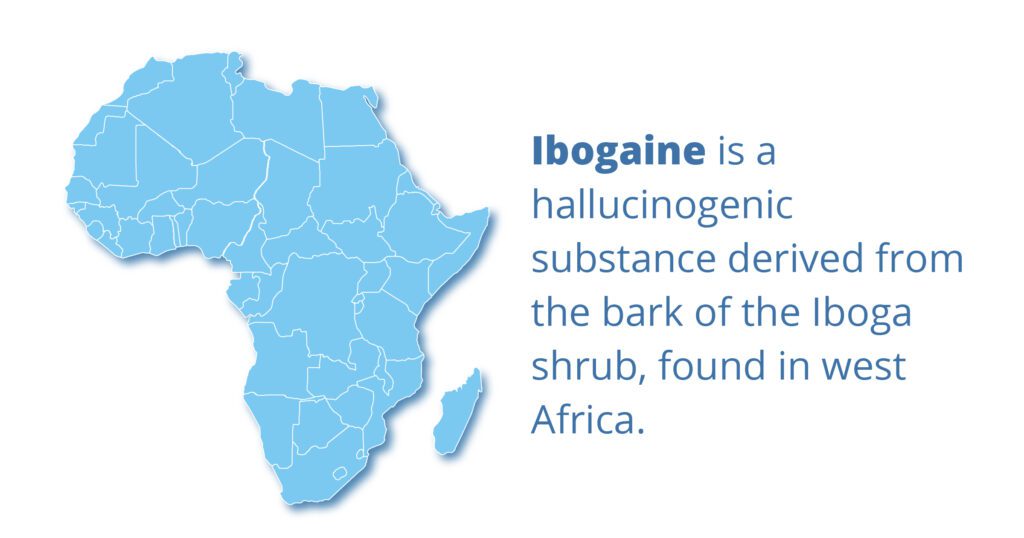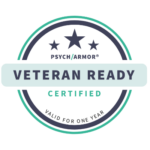America is facing an epidemic of addiction. According to the CDC National Center for Health Statistics, over 90,000 people died from a drug overdose in 2020. That is approximately 20,000 people more than in 2019, and many experts expect the number to be even higher in 2021. Opiate and heroin addiction accounts for a large number of those tragic deaths. As the number of addiction-related deaths increases, some people look for answers in alternative treatment methods. This includes using ibogaine for addiction treatment.

Ibogaine is the dried and processed root of the Tabernanthe iboga plant, a shrub native to the rainforests of Western Africa. It has been used for thousands of years by tribal cultures in their religious ceremonies. In low doses, ibogaine has a stimulant effect, and with higher doses, it’s a hallucinogen.
The use of ibogaine has recently increased in the West, primarily due to its purported usefulness as a treatment for opioid addiction. Unfortunately for those who need help with substance abuse, little research is available to support the claim that ibogaine can treat addiction.
ibogaine therapy is credited with treating addiction
- Opioids
- Heroin
- Alcohol
- Methamphetamine
- Adderall
- Cocaine
In the United States, ibogaine is classified as a Schedule 1-controlled substance and is illegal. That classification means that the FDA has found no medical application for the substance, not even with medical supervision. Several other countries, including Belgium, Denmark, Switzerland, Sweden, and the UK. People seeking ibogaine treatment must travel to clinics outside of the U.S. or risk arrest. Ibogaine clinics in Mexico have become a popular destination for U.S. citizens desperate to get help with opiate addiction.
The controversy around ibogaine’s value as a treatment for opioid addiction is based on the following factors:
- Several deaths have been attributed to the use of ibogaine
- Ibogaine is illegal in the United States and many other western countries
- Ibogaine has not been well-researched
- It is a hallucinogen with a high potential for abuse
As a medication to assist with drug addiction, ibogaine is most often given in a single dose.
How It Works
There are few studies to explain all of ibogaine’s effects, but what is known is that once ingested, ibogaine converts to a compound called noribogaine. Noribogaine affects those portions of the brain associated with addiction. Proponents of the substance claim that noribogaine helps individuals stop using opioid drugs by easing opioid withdrawal symptoms. However, even those who support the use of ibogaine for opiate addiction stress the need for conventional, evidence-based treatments and therapies for long-term recovery. Ibogaine is viewed as a tool for reducing withdrawal symptoms, not as a miracle cure for addiction.
This distinction is an important one. Medically supervised detox is already recommended for people with opioid addiction. Medications such as methadone, buprenorphine, and suboxone—all of which have been researched and approved for medical use by the FDA—are currently being used successfully to treat opioid withdrawal symptoms.
Any claims that addiction can be “cured” by ibogaine or any other substances are suspect. The National Institute on Drug Abuse explains that addiction can be treated, but effective treatment must address all of a patient’s needs, not just withdrawal symptoms. As difficult as it is, detoxing is only the first step in drug and alcohol recovery.
Successful treatment for addiction includes:
- Detox
- Medication
- Evaluation and treatment for co-occurring mental health issues
- Assessment and treatment for physical health issues
- Peer support
- Behavioral therapies
- Long-term prevention relapse support
Breaking the cycle of addiction requires a multi-pronged approach that includes approved medical interventions. Before paying large sums of money to travel out of the country in search of a miraculous treatment that has very little scientific research behind it, speak with your healthcare provider or a recovery specialist.
What to Expect from Ibogaine Treatment
Because it is not a regulated substance, protocols for administering ibogaine and dosage amounts vary from clinic to clinic. Participants should receive a thorough medical exam by a qualified physician to make sure they have no complications that could increase the risks associated with ibogaine.
To begin the treatment, it is typical to be administered a “test dose” by a physician to make sure recipients do not have any adverse reactions. After that, a “flood dose” will bring on the full force of the psychoactive properties. Ibogaine is administered through an IV, and participants should be closely monitored by medical staff throughout the experience.
The theory is that while undergoing a hallucinogenic trip, participants will experience an internal healing journey that resolves the traumas that led to an addiction, to begin with. While on this journey, ibogaine will also manage withdrawal symptoms.
A booster dose may be required for those who are still experiencing withdrawal symptoms after an appointed time period. Participants in ibogaine therapy are warned to expect feelings of mental and physical exhaustion throughout the process which can last several days.
Once the effects of the drug taper off, participants of ibogaine therapy are often described as “non-addicts” with brains that have been reset to their pre-addicted state. They are encouraged to engage in activities that are common in the world of recovery such as seeking therapy, participating in support groups, finding sober living accommodations, and staying away from places and people that trigger addictive tendencies.
In other words, for ibogaine therapy to be successful, patients must follow the same guidelines provided by every traditional, accredited addiction treatment facility.
The Cost of Ibogaine
Ibogaine treatment centers charge high prices (around $10,000) to administer an unregulated substance that may or may not help with symptoms of opiate withdrawal. It is understandable that individuals with an opioid use disorder, and those who care about them, are desperate for solutions. But claims that ibogaine can cure addiction in a single session are, at best, misleading, especially when proponents of the treatment stress the importance of following up with traditional recovery therapies.
Can Ibogaine Treat Addiction Safely?
As a hallucinogen, ibogaine itself has a high potential for abuse. Though some hallucinogens are considered addictive, ibogaine has not yet been classified as such. However, like all hallucinogens, it can lead to developing tolerance. Due to a lack of research, it is unclear what effects ibogaine may have on the brain. There are no long-term studies to clarify the potential risks of extended use. In any discussion about the efficacy and safety of ibogaine it is important to remember the following points:
- Few studies have been conducted on ibogaine, and those that were conducted were on small groups.
- Studies have been almost solely limited to ibogaine’s effect on opioid addiction.
- Some studies were conducted without proper scientific controls.
Without placebo-controlled, independently-funded clinical trials with measurable end-points, the effectiveness and safety of ibogaine remain uncertain. The production of ibogaine is unregulated, so there is no guarantee of the purity of the substance when used. This leads to concerns about dosage levels, and in the clinical studies, different dosages were used.
Risks associated with ibogaine therapy include:
- Persistent psychosis
- Visual and auditory hallucinations
- Decreased muscle coordination
- Dry mouth
- Nausea/vomiting
- Hallucinogen Persistent Perception Disorder (HPDD)
- Heart palpitations
- Loss of consciousness
- Death
Can ibogaine treat addiction? While limited research does show it may be effective at making opioid withdrawal less severe, other medications that have been widely researched, tested, and approved by the FDA are available to assist with detox. People with liver problems and heart conditions are especially cautioned against using ibogaine.
Can Ibogaine Treat Addiction? There are Safer Alternatives
Time and research may prove that ibogaine is an effective and safe treatment for opiate addiction, but there are evidence-based treatments that can be trusted for now.
Medical Detox
Medically supervised detox programs keep patients safe and comfortable. Experienced medical staff administer medications to reduce the severity of detox symptoms and monitor progress. In addition, during a medically supervised detox, co-occurring mental health disorders are diagnosed and treated, increasing the chances of long-term sobriety and quality of life.
Behavioral Therapy
Behavioral therapy is shown to help those with substance abuse disorders change their behaviors in the long run, not just while in therapy. Family therapy, cognitive therapy, individual and group therapy are just some of the evidence-based treatments used to help addicts live drug-and alcohol-free after leaving a treatment facility.
Community Support Groups
Groups like Narcotics Anonymous (NA), Smart Recovery, and other 12-step programs are valuable resources that provide accountability, non-judgmental support, and healthy interactions with peers. Especially for those new in recovery, participating in a community support group helps keep them on track with their sobriety goals.
Opioid Treatment at The Haven
If you are ready to treat your addiction to heroin or other opioids, don’t take a chance on experimental alternative treatments. The Haven offers comprehensive opioid treatment, including medically supervised detox to keep patients safe and comfortable. We also provide the therapies, support, and aftercare services needed for successful long-term recovery from drugs and alcohol. Contact us today for more information about treatment options for opioid and heroin addiction.






